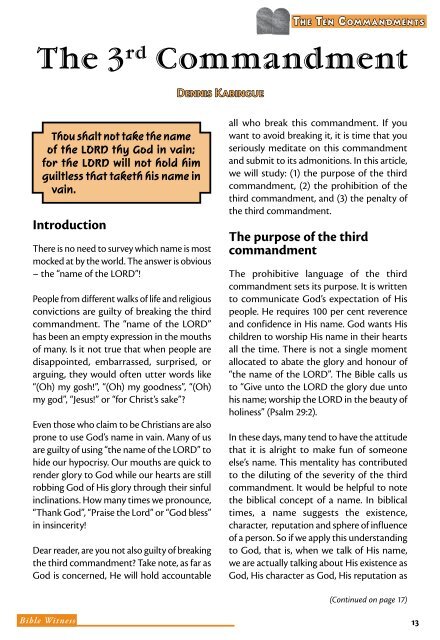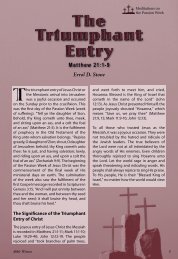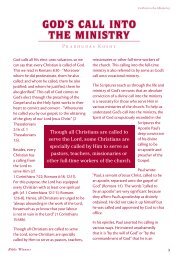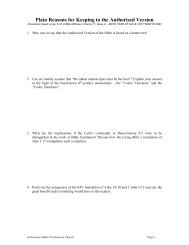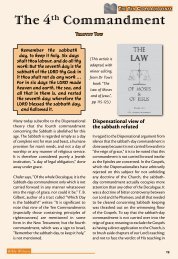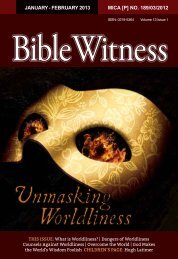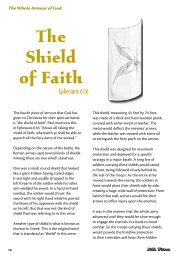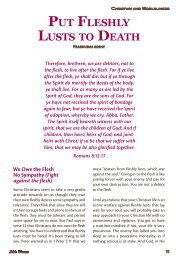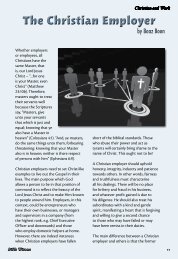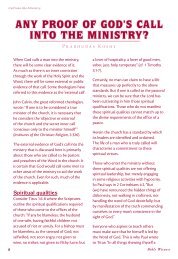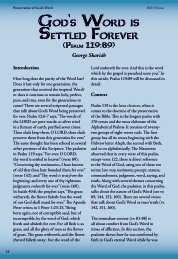The 3rd Commandment - Bible Witness Media Ministry
The 3rd Commandment - Bible Witness Media Ministry
The 3rd Commandment - Bible Witness Media Ministry
You also want an ePaper? Increase the reach of your titles
YUMPU automatically turns print PDFs into web optimized ePapers that Google loves.
<strong>The</strong> Te n Com m a n dments<br />
<strong>The</strong> 3 rd <strong>Commandment</strong><br />
Dennis Kabingue<br />
Thou shalt not take the name<br />
of the LORD thy God in vain;<br />
for the LORD will not hold him<br />
guiltless that taketh his name in<br />
vain.<br />
Introduction<br />
<strong>The</strong>re is no need to survey which name is most<br />
mocked at by the world. <strong>The</strong> answer is obvious<br />
– the “name of the LORD”!<br />
People from different walks of life and religious<br />
convictions are guilty of breaking the third<br />
commandment. <strong>The</strong> “name of the LORD”<br />
has been an empty expression in the mouths<br />
of many. Is it not true that when people are<br />
disappointed, embarrassed, surprised, or<br />
arguing, they would often utter words like<br />
“(Oh) my gosh!”, “(Oh) my goodness”, “(Oh)<br />
my god”, “Jesus!” or “for Christ’s sake”<br />
Even those who claim to be Christians are also<br />
prone to use God’s name in vain. Many of us<br />
are guilty of using “the name of the LORD” to<br />
hide our hypocrisy. Our mouths are quick to<br />
render glory to God while our hearts are still<br />
robbing God of His glory through their sinful<br />
inclinations. How many times we pronounce,<br />
“Thank God”, “Praise the Lord” or “God bless”<br />
in insincerity!<br />
Dear reader, are you not also guilty of breaking<br />
the third commandment Take note, as far as<br />
God is concerned, He will hold accountable<br />
all who break this commandment. If you<br />
want to avoid breaking it, it is time that you<br />
seriously meditate on this commandment<br />
and submit to its admonitions. In this article,<br />
we will study: (1) the purpose of the third<br />
commandment, (2) the prohibition of the<br />
third commandment, and (3) the penalty of<br />
the third commandment.<br />
<strong>The</strong> purpose of the third<br />
commandment<br />
<strong>The</strong> prohibitive language of the third<br />
commandment sets its purpose. It is written<br />
to communicate God’s expectation of His<br />
people. He requires 100 per cent reverence<br />
and confidence in His name. God wants His<br />
children to worship His name in their hearts<br />
all the time. <strong>The</strong>re is not a single moment<br />
allocated to abate the glory and honour of<br />
“the name of the LORD”. <strong>The</strong> <strong>Bible</strong> calls us<br />
to “Give unto the LORD the glory due unto<br />
his name; worship the LORD in the beauty of<br />
holiness” (Psalm 29:2).<br />
In these days, many tend to have the attitude<br />
that it is alright to make fun of someone<br />
else’s name. This mentality has contributed<br />
to the diluting of the severity of the third<br />
commandment. It would be helpful to note<br />
the biblical concept of a name. In biblical<br />
times, a name suggests the existence,<br />
character, reputation and sphere of influence<br />
of a person. So if we apply this understanding<br />
to God, that is, when we talk of His name,<br />
we are actually talking about His existence as<br />
God, His character as God, His reputation as<br />
(Continued on page 17)<br />
<strong>Bible</strong> <strong>Witness</strong><br />
13
<strong>The</strong> Te n Com m a n dments<br />
Charles Spurgeon<br />
on the Law of God<br />
<strong>The</strong> Law is the stormy wind<br />
which drives souls into the harbour<br />
of refuge. <strong>The</strong> Law is the sheriff’s<br />
officer to shut men up in prison<br />
for their sin, concluding them<br />
all under condemnation in<br />
order that they may look to the<br />
free Grace of God, alone, for<br />
deliverance! This is the object of the<br />
Law—it empties, that Grace may fill—and<br />
wounds that Mercy may heal. It has never been God’s intention<br />
towards us, as fallen men, that the Law should be regarded as<br />
a way to salvation for us, for a way of salvation it can never be.<br />
Had man never fallen. Had his nature remained as God made<br />
it, the Law would have been most helpful to him to show him<br />
the way in which he should walk. And by keeping it he would<br />
have lived, for, “he that does these things shall live in them.”<br />
But ever since man has fallen, the Lord has not proposed to<br />
him a way of salvation by works, for He knows it to be impossible<br />
to a sinful creature. <strong>The</strong> Law is already broken and whatever<br />
man can do, he cannot repair the damage he has already done.<br />
<strong>The</strong>refore he is out of court as to the hope of merit. <strong>The</strong> Law<br />
demands perfection, but man has already fallen short of it and,<br />
therefore, let him do his best, he cannot accomplish what is<br />
absolutely essential. <strong>The</strong> Law is meant to lead the sinner to faith<br />
in Christ by showing the impossibility of any other way! It is the<br />
black dog to fetch the sheep to the shepherd. It is the burning<br />
heat which drives the traveller to the shadow of the great rock<br />
in a weary land.<br />
16<br />
<strong>Bible</strong> <strong>Witness</strong>
(Continued from page 13)<br />
God and His sphere of influence as God! So<br />
when people make fun of the name of the<br />
LORD, they are making fun of His existence,<br />
His character, His reputation and His influence.<br />
In other words, they are mocking God right<br />
at His face!<br />
Do you now see how grievous it is to break<br />
the third commandment If you are guilty of<br />
taking the name of the Lord in vain, repent<br />
and warn your friends who likewise take His<br />
<strong>The</strong> Te n Com m a n dments<br />
you, and I will curse your blessings: yea, I have<br />
cursed them already, because ye do not lay it<br />
to heart” (Malachi 2:2).<br />
Solomon, under the inspiration of the Holy<br />
Spirit, rallies God’s people to secure a good<br />
name. In the book of Proverbs, he wrote, “A<br />
good name is rather to be chosen than great<br />
riches, and loving favour rather than silver and<br />
gold” (Proverbs 22:1). In Ecclesiastes 7:1, he<br />
wrote, “A good name is better than precious<br />
ointment; and the day of death<br />
than the day of one’s birth.” If<br />
God is teaching His people to<br />
do their best to preserve a good<br />
name, this should make you think<br />
how much more God treasures<br />
His own name.<br />
<strong>The</strong> prohibition of the<br />
third commandment<br />
<strong>The</strong> prohibition of the third<br />
commandment is against using<br />
the name of the Lord in vain. At<br />
the outset, it may look simple.<br />
But, it is not so. <strong>The</strong> coverage<br />
of this prohibition is very<br />
broad. Let no one think that<br />
he is only guilty of breaking the<br />
third commandment when he<br />
says, “(Oh) my gosh!”, “(Oh) my<br />
goodness”, “(Oh) my god”, “Jesus!”<br />
or “for Christ’s sake”.<br />
name in vain. Otherwise, you are in danger of<br />
God’s wrath! Listen to the warning of the Lord,<br />
“If ye will not hear, and if ye will not lay it to<br />
heart, to give glory unto my name, saith the<br />
LORD of hosts, I will even send a curse upon<br />
To follow this thought, it is<br />
important to consider the<br />
phrase “the name of the LORD”<br />
and also the meaning of the word<br />
“vain”. <strong>The</strong> word “vain” describes “anything<br />
that is unsubstantial, unreal, worthless, either<br />
materially or morally”. Since “the name of the<br />
LORD” speaks of the person and the work of<br />
God, any “unsubstantial, unreal, worthless”<br />
<strong>Bible</strong> <strong>Witness</strong><br />
17
<strong>The</strong> Te n Com m a n dments<br />
usage or reference either to His person or<br />
His work is a direct violation of the third<br />
commandment.<br />
Question 113 of the Westminster Larger<br />
Catechism indicates that the prohibition of<br />
the third commandment includes the abuse of<br />
the names or titles of God in swearing and evil<br />
talk, the violation of His commandments, the<br />
misapplication of His truths and the adherence<br />
to false doctrines.<br />
We violate this commandment even when<br />
we doubt the promises of God and teach<br />
His Word wrongly. This commandment also<br />
warns those who are teaching in the Sunday<br />
school or those who are called to the pulpit<br />
ministry not to twist and turn God’s Word. We<br />
must preach it faithfully. Otherwise, we are in<br />
danger of God’s wrath (cf. Matthew 5:19-20).<br />
How about the Charismatics and the<br />
Pentecostals who seem to be full of piety<br />
<strong>The</strong>y love to shout out the name of the Lord.<br />
In their worship services, they often proclaim,<br />
“Hallelujah, praise the Lord”, “I love you, Jesus”,<br />
“We magnify your name, O Lord”, etc.<br />
I remember attending a Christmas Cantata<br />
where godly songs of the Advent were mixed<br />
with the songs of the world like “Frosty the<br />
Snow Man” and “Twelve Days of Christmas”. At<br />
the end of the programme, the pastor claimed<br />
that they have exalted God’s name. How could<br />
they claim that the Lord was exalted by the<br />
singing of unbiblical worldly songs This is<br />
very much like those who would say to the<br />
Lord at His coming, “Lord, Lord, have we not<br />
prophesied in thy name and in thy name have<br />
cast out devils and in thy name done many<br />
wonderful works”, but would be rebuked by<br />
Him, “I never knew you: depart from me, ye<br />
that work iniquity” (Matthew 7:22-23).<br />
<strong>The</strong> penalty of the third<br />
commandment<br />
<strong>The</strong> penalty of the third commandment may<br />
not be stated for every situation but one thing<br />
is certain, no guilty party can escape from the<br />
wrath of God. <strong>The</strong> Lord vowed that any guilty<br />
party will not remain guiltless. “Thou shalt not<br />
take the name of the LORD thy God in vain;<br />
for the LORD will not hold him guiltless that<br />
taketh his name in vain’’ (Exodus 20:7).<br />
In the Old Testament economy, those<br />
blaspheming the name of the Lord were<br />
stoned to death. “And he that blasphemeth<br />
the name of the LORD, he shall surely be<br />
put to death, and all the congregation shall<br />
certainly stone him: as well the stranger, as he<br />
that is born in the land, when he blasphemeth<br />
the name of the LORD, shall be put to death”<br />
(Leviticus 24:16).<br />
Conclusion<br />
After reading this article, what is your<br />
assessment of yourself Some would be<br />
moved to lament like the Apostle Paul, “O<br />
wretched man that I am! who shall deliver me<br />
from the body of this death” While the Law of<br />
God condemns our sins, it points us to Christ,<br />
who alone is our hope of salvation! Are you<br />
not thankful for the Law that points you to<br />
Christ and for His<br />
forgiveness when<br />
you repent May<br />
we also trust in<br />
the Spirit of God<br />
for His aid not to<br />
violate the third<br />
commandment<br />
but to magnify His<br />
name more and<br />
more! •<br />
18<br />
<strong>Bible</strong> <strong>Witness</strong>


